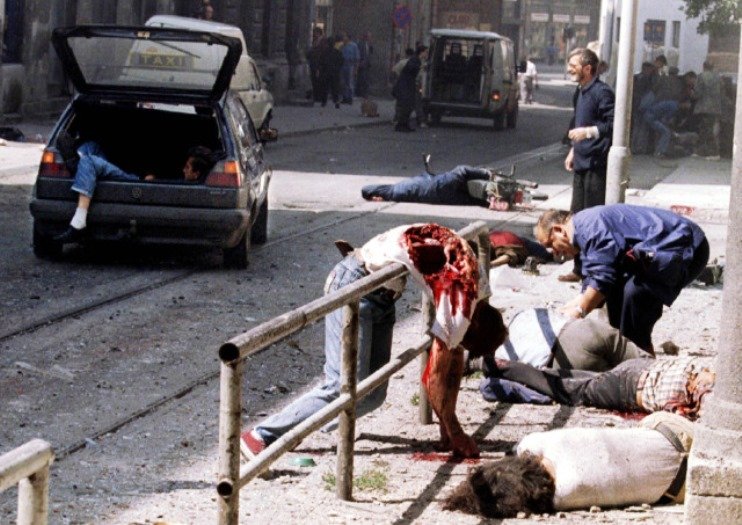April 6, 2017 – Washington, D.C. – The Advisory Council for Bosnia and Herzegovina (ACBH) commemorates the Siege of Sarajevo that began this week in 1992 and lasted until February 29, 1996. For 1,425 days, the brave and resilient residents of the capital city of Bosnia and Herzegovina endured continuous shelling and sniper attacks by the Serb forces while being forced to live without water, electricity, medicine, and with very little food.
On April 6, 1992, the Serb forces of Republika Srpska and the Yugoslav People’s Army besieged Sarajevo with a clear intent to destroy its multiethnic fabric and eliminate any resemblance of religious and cultural cohabitation. Sarajevo is a city where Christianity, Islam and Judaism flourished side by side for centuries, and its residents have historically lived in unity. The siege of Sarajevo became the longest siege in modern day history, and it not only marked the start of the war of aggression against Bosnia and Herzegovina, but also the beginning of genocide and ethnic cleansing throughout the country.
In March of 2016, the International Criminal Tribunal for the former Yugoslavia (ICTY) – a UN court of law established to prosecute crimes committed during the conflict in the Balkans in the 1990s, ruled that Radovan Karadzic, Bosnian Serb wartime leader committed genocide in Srebrenica against its non-Serb population and participated in a Joint Criminal Enterprise (JCE) which among many other things, aimed to establish and carry out a campaign of sniping and shelling against the civilian population of Sarajevo and spread terror among civilians. Karadzic is the most senior Bosnian Serb leader to face prosecution. He was sentenced to 40 years in prison.
11,541 individuals lost their lives in the Siege of Sarajevo, many of them children. The human toll from the war is astounding and devastating: over 100,000 killed, over 2 million displaced and according to the United Nations (UN), between 20,000 – 50,000 mostly Bosniak (Bosnian Muslim) women and girls raped. This is a somber day for citizens of Bosnia and Herzegovina and for the Bosnian diaspora across the globe, and it challenges us to remember the innocent men, women and children who lost their lives in the 1992-1995 war of aggression against Bosnia and Herzegovina.
Bosnia and Herzegovina’s challenges did not stop when the war ended. The Dayton Peace Accords halted the gunfire, but the society continues to be devoid of justice for rape, camp, and genocide survivors. Twenty-five years after the beginning of the war, corruption, ethnically charged political rhetoric and a high unemployment rate continue to threaten the country’s progress.
Today, we remember the heroic perseverance that Sarajevo, its courageous defenders, and its citizens endured, and in solidarity with April Genocide Prevention Month, ACBH is remembering victims of genocide and honoring the survivors. Lastly, ACBH urges the United States and the international community to re-commit its efforts in the campaign against genocide and mass atrocities that are currently being committed in Iraq and Syria.
__________
ACBH is an independent, non-profit organization dedicated to advancing the interests of Bosnian Americans and works to improve relations between the United States and BiH. ACBH advocates for a united, democratic, multiethnic, and indivisible BiH with a primary goal of advancing the integration of BiH into the EU and NATO.
BHDINFODESK






